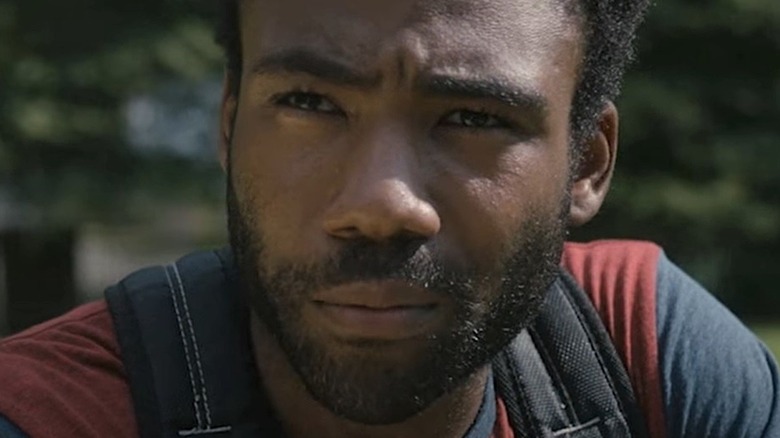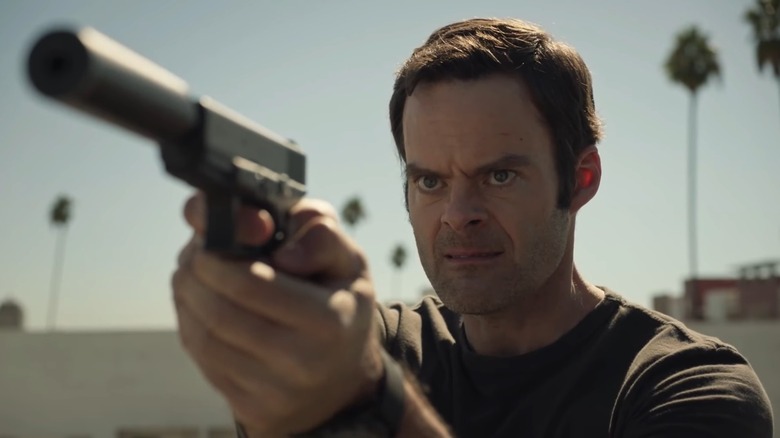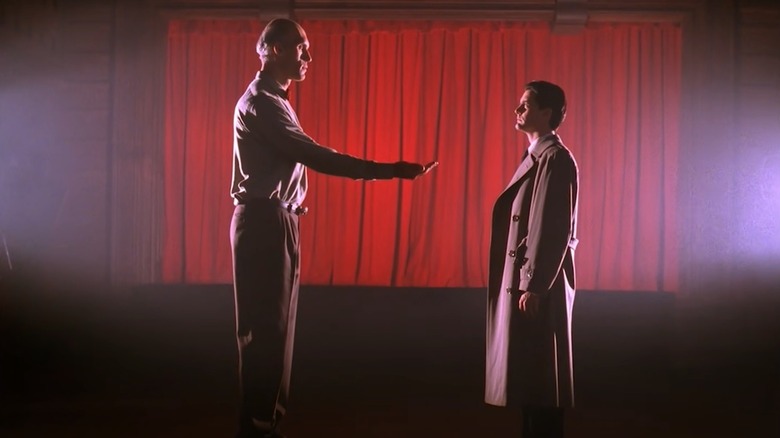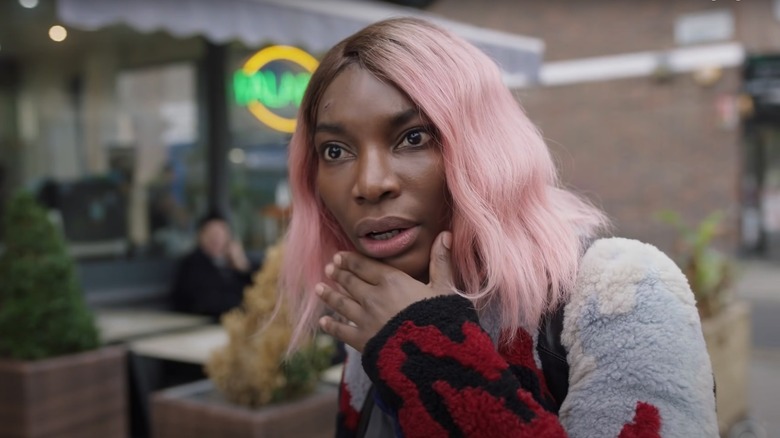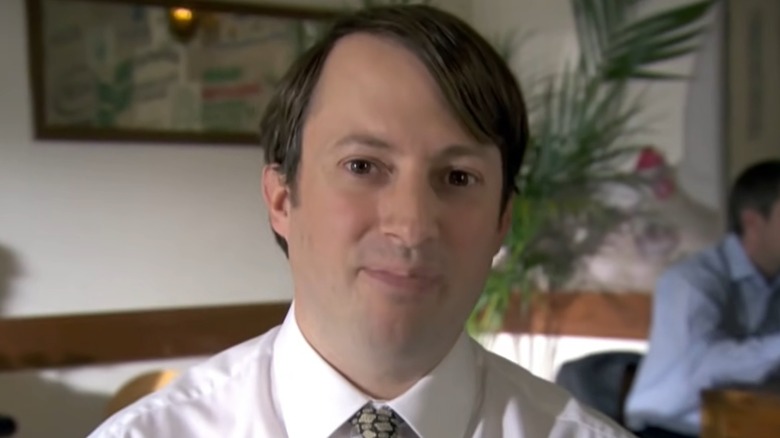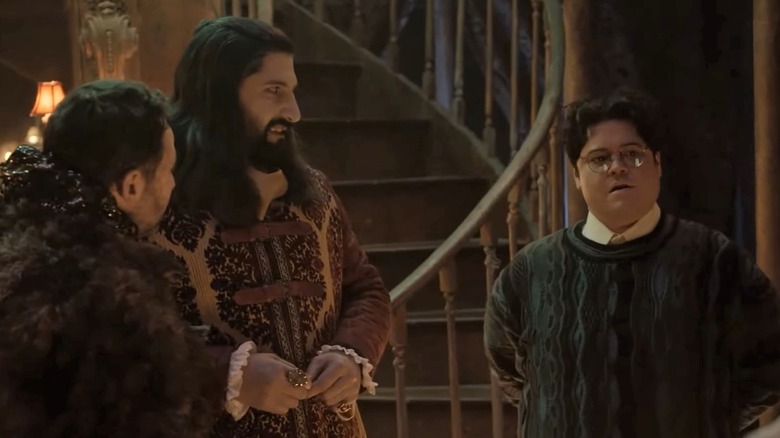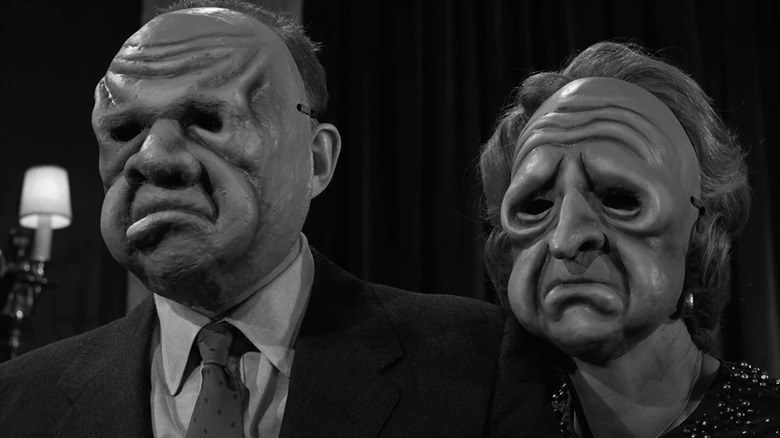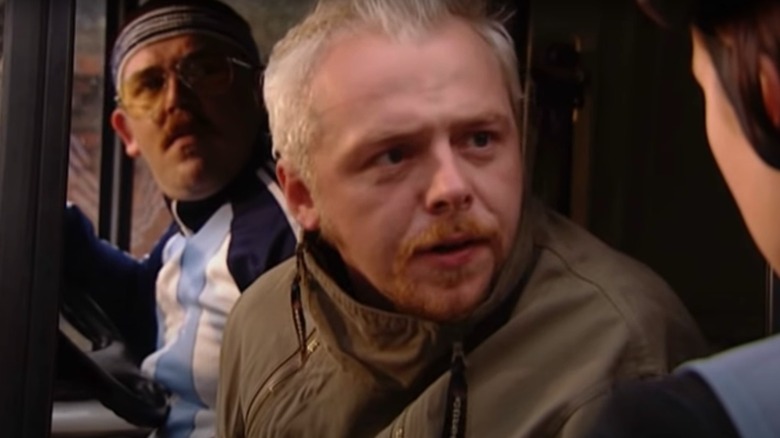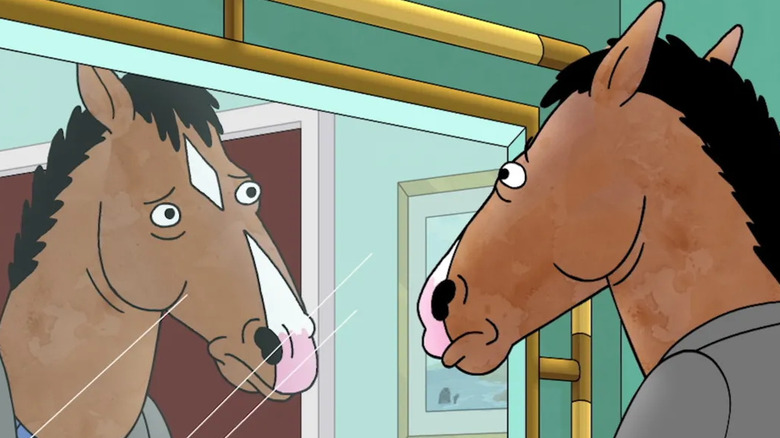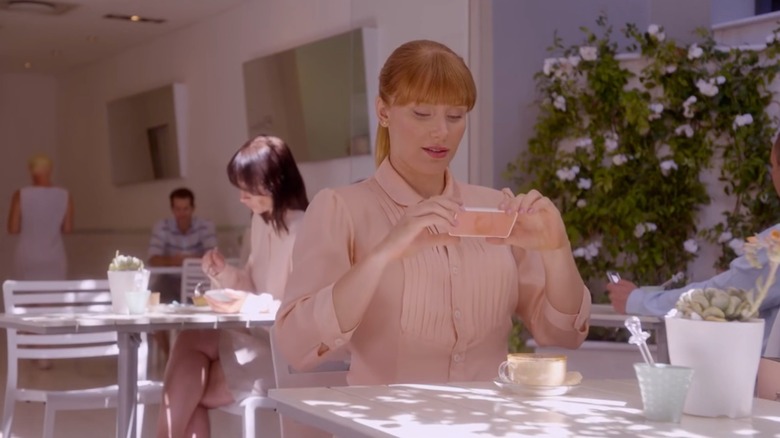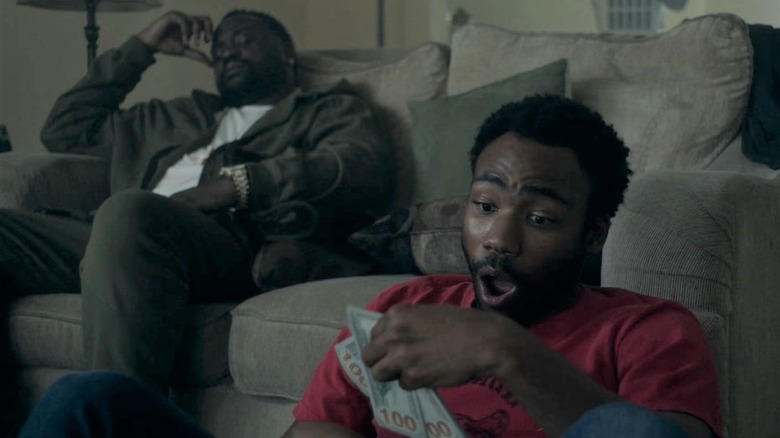Genre-Bending TV Shows You Need To Watch
In this day and age, with so much TV content readily available to us, it can be a tedious endeavor to sort through it all. Choosing a particular genre helps narrow down our choices to the vibes we tend to enjoy the most. After all, each genre has its own style of storytelling, characterization, dialogue, humor, and visual flair. And certain genres recur with great frequency and have solidified their popularity over the decades, with some of the best TV shows proving themselves by doing well in one specific area (horror, sci-fi, drama, etc.).
However, there are other shows that blend the lines between different genres and subgenres, turning tropes and conventions on their heads to bring us what's called genre-bending. And by mixing and matching and playing with different kinds of stories, these series have gone on to become some of the most influential in the game. If you want to take into a dive into this weird world of TV, never fear, we've got you covered. From hitman comedies to animated dramedies, these are the genre-bending TV shows you need to watch.
Barry
"Barry" stars "Saturday Night Live" alum Bill Hader as Barry Berkman, a hitman who's pretty miserable with his life. But things start turning around when he heads out to Hollywood and winds up in an acting class. It doesn't take long for him to fall in love with the idea of performing. Of course, when you've killed as many people as Barry has, you can't just put down your pistol and step onto the stage without a few complications.
"Barry" is introduced as a black comedy and never completely abandons this tone, but when the show shifts moods, those moments will make your jaw drop. Created by Hader and Alec Berg, HBO's "Barry," executes the delicate balance between comedy and drama nearly flawlessly. The episode "ronny/lily" from Season 2 is a prime example of the constant genre-shifting prevalent throughout the course of the series, as it goes from martial arts action to surreal imagery to twisted comedy. Similarly, there are some particularly quirky characters in "Barry" that appear deadly serious in one scene then, alternately, quite hilarious in the next.
As Barry's lifestyle as a hitman bleeds (no pun intended) into his newfound life as a hopeful actor, the show masterfully jumps from drama to comedy, all while staying in the rules of its reality and the genre it's created for itself. With each season only clocking in at only around 4 hours each, "Barry" is a must-see.
Twin Peaks
Television has taken a new level of prestige with cinematic storytelling, top-tier performances, and rich production value. However, this level of achievement is not unprecedented. Please allow us to introduce you to "Twin Peaks."
Created by Mark Frost and the mind-bending master himself, David Lynch, the '90s cult classic "Twin Peaks" is a unique blend of soap opera, mystery, and horror, with a heaping dose of surrealism. Inspired by classic daytime TV and police procedurals storytelling tropes, Lynch and Frost steeped the show in those aesthetics. Then, with increasing intensity — spoiler alert — they layered in paranormal elements. This approach made "Twin Peaks" original, daring and unpredictable. "Twin Peaks" still felt realistic and honest even as it grew increasingly odd and supernatural, supplying an avant-garde style that most daytime serials lacked at the time. By combining genres, "Twin Peaks" proved a progressive piece of art.
While many shows have attempted to cross genres in recent years, very few have done so with the level of sophistication and boldness as "Twin Peaks." This level of genre fluidity, along with its unorthodox approach toward storytelling conventions, allowed the show to remain relevant and influential all these years later, with a third season in 2017. Genre-blending also allowed it to take some truly exciting artistic risks, cementing its status as more than just a mere television serial.
I May Destroy You
Created by the brilliant Michaela Coel (also the creator of the sitcom "Chewing Gum"), "I May Destroy You" is one of the most uniquely complex shows on television.
The show focuses on social media star and author Arabella (Coel), who wakes up after a night out with a hangover from hell and very fuzzy memories on what happened to her. However, as the day progresses, she begins experiencing fragments of intrusive, frightening flashbacks -– flashbacks that indicate she's been the victim of a sexual assault. The series alternates genres between its broad stories about sexually adventurous friends and more individual and upsetting moments of persistent trauma, implementing a formal attitude and a willingness to play within genre boundaries just to easily demolish them. Despite the seriousness of the subject matter, "I May Destroy You" still manages to find laughs amongst the trauma and utilizes Cole's comedic and dramatic talent to great effect.
"I May Destroy You" is a show that delves into and confronts the complexities of sexual assault, all the forms it can take, and how victims navigate survival. For those reasons and more, "I May Destroy You" is undoubtedly one of the most intriguing, intricately crafted shows in recent memory.
If you or anyone you know has been a victim of sexual assault, help is available. Visit the Rape, Abuse & Incest National Network website or contact RAINN's National Helpline at 1-800-656-HOPE (4673).
Peep Show
In 2010, "Peep Show" became Channel 4's longest-running comedy show in history. The series, which aired from 2003-2015, revolves around the escapades of Jeremy (Jez) and Mark, two roommates who bumble their way through a series of mishaps in South London.
"Peep Show" is famed for its ambitious use of the first-person perspective and interior monologues, allowing us to see what characters are seeing and to hear their thoughts. The sitcom's format was cutting edge and produced results that very few shows could match. And thanks to those unusual POV shots, audiences are treated to all sorts of witty remarks bouncing around in Mark and Jez's heads. Plus, these two roommates continually find themselves entangled in unfortunate situations, all the while being incredibly relatable as they pile up regrets with each passing episode.
When "Peep Show" writer Sam Bain was asked what sociological themes he hoped viewers would take from the series, he answered, "The stubborn persistence of human suffering," which, in and of itself, may sound funny as a quip, but it rings true while viewing the show.
What We Do in the Shadows
Brought to television by director Taika Waititi and Jemaine Clement, "What We Do in the Shadows" – based on their film of the same name – is a series about a group of blood-sucking creatures living together under one roof in Staten Island. However, these vampires' day-to-day lives are followed by a documentary crew. The nocturnal characters came to America hundreds of years ago with a mission to conquer the newly forming country, but not all went to plan. Now, in present day, their mission has all but been abandoned.
They're undead, eccentric, and far more interested in settling their roommate disputes and trudging to Manhattan for a night out. They don't seem interested in fighting over the fate of the world, which is often the case with movies about these mythical beings. Their interests are far more ... human.
Co-creator Jemaine Clement stated in an interview with The AV Club how the show's structure was inspired by "Curb Your Enthusiasm" and "Seinfeld," and this proves evident by the absurdism of the show, particularly when the supernatural realm contrasts with the boringness of suburban life. By having fun with horror tropes and focusing on immortal creatures who have no business being in this century, "What We Do in the Shadows" generates more convulsive laughter than any comedy on television.
The Twilight Zone
Okay, anyone who loves a good plot twist is surely in for a treat with Rod Serling's iconic "The Twilight Zone." The series follows new characters, stories, twists and turns with each episode, and it never seems to run out of interesting and thought-provoking ideas. Serling was able to take a wide amount of genres — notably sci-fi and horror but also fantasy, comedy, and Westerns — and meld them together to create something truly unique. No matter the setting, each episode of "The Twilight Zone" was able to pose thought-provoking questions, elevate the speculative genres, and both mesmerize and horrify audiences.
"The Twilight Zone" wasn't sensational or simplistic, and within its genres, it produced a plethora of compelling characters and fresh storylines, whether that involved supernatural games of pool, possible alien invasions, or plane rides from hell. And Serling was never afraid of diving into tough political, psychological, or sociological issues. Through his TV show, the host/showrunner used sci-fi and horror to critique the world around him. Audiences might've expected simple stories about beings from another world, but really, they were given some serious food for thought as episodes addressed issues ranging from fear-mongering to conformity. Using genre as a tool to implant its erratic ideas in our brains, "The Twilight Zone" revolutionized genre television and has proved to stand the test of time.
Spaced
Before they teamed up on the "Three Flavors Cornetto Trilogy," Edgar Wright, Simon Pegg, and Nick Frost joined forces for an absolutely brilliant TV show that ran from 1999 to 2001 — one that would foreshadow all of the wonderfully twisted insanity to come.
The short-lived "Spaced" follows the often surreal misadventures of a quirky group of 20-somethings living in North London. The style of comedy crafted by co-writers/stars Jessica Hynes and Simon Pegg was brought to life by the idiosyncratic visual style of director Edgar Wright. Drawing from classic shows like "The Simpson," "Spaced" engages audiences with quick cutaways, allowing for endless running gags and some tongue-in-cheek nods at some of our favorite movies and TV shows.
The show references (sometimes in the dialogue, sometimes in direct parodies) everything from "The Phantom Menace" to "The Matrix," and it all plays out with that delightful Edgar Wright energy. Seriously, the show is the blueprint for "Shaun of the Dead," "Hot Fuzz," and "The Worlds' End," both in its style and in its love of incorporating absurd, fantastical elements. "Spaced" never becomes full-on science fiction, but it uses the genre's DNA to creatively display its presentation in a way that would go on to define Wright's style.
BoJack Horseman
"BoJack Horseman" stands head, shoulders, and hooves about the rest of adult animation. And we don't mean that as insult. Sure, "The Simpsons" is fantastic, but "BoJack Horseman" takes the humor you're expecting and combines it with some of the most emotionally devastating material you've ever seen, regardless of the medium.
The show introduces a guy, who's also a horse, who's also a former sitcom actor who makes poor personal and professional decisions. There are funny episodes about BoJack, but as the series goes on, one starts to notice how the silly premise cycles through the bleak topics like depression, thus allowing the most heartbreaking parts of life to leach onto the genre that's meant to soothe them.
The series takes more than its fair share of shots at pop culture and does an amazing job of turning animated sitcoms on their head. There's also a continuous investment in the characters of "Bojack Horseman," as well as the ever-prominent dark humor that characterizes the show, all of which gradually grows in a way that we would never expect. It's tough to consider "Bojack Horseman" as a straight-up drama since the jokes are always there, but the intent of its themes become far bleaker as the series progresses. "Bojack Horseman" is a one of a kind show that dismantles dramedy and pain, then reconstructs them for its viewers to interpret.
Black Mirror
Following in the footsteps of "The Twilight Zone," "Black Mirror" (referring to the reflective black screen when your phone or computer is out of use) is an insightful anthology series in which each episode closely examines of our interactions with each other through our devices and how reliant we've become on this tech. "Black Mirror" aims to entertain, but it also invites us to think about how technology can harm society and transform our behavior. Genres including science fiction, horror, suspense, and drama all help convey the importance of the topics and themes materializing on the screen.
By putting its emphasis on our relationship with tech, viewers can easily identify with most of the situations in "Black Mirror," whether it's being obsessed with social media or toxic fandom. Of course, it does this by approaching its subject matter through truly wild means, whether that's a "Star Trek" homage, a murder mystery, or a plot involving a politician and a pig. These familiar yet freaky situations can take our characters down roads of anxiety, destruction, and even death.
"Black Mirror" remains one of the very few shows where you can find a real exploration of the moral and social questions of our day — leaving its viewers in a conundrum over whether or not to delete their Instagram.
Atlanta
Donald Glover is the creator, executive producer, and lead actor in "Atlanta," a show about two cousins trying to make their way in the Atlanta rap game. Donald Glover plays Earn, who has a lousy, menial job, an unstable living situation, and a young child to care for. He learns that his cousin, a rapper called "Paper Boi" (Brian Tyree Henry), has gained some serious popularity in the Atlanta community. Earn sees this as an opportunity to better his life, so he contacts his cousin and offers to manage him.
The characters in "Atlanta" are some of the show's most glowing assets. The series routinely breaks the unspoken rules that govern TV plotting, structure, and characterization by going against the grain and speaking toward what's on the mind of the "Atlanta" writers. And the show displays an affinity for unsettling situations as in the Kubrickian suspense of the episodes "Teddy Perkins" and "Woods." As each episode progresses, "Atlanta" gives us no reason to believe it'll divert expectations, only to gradually delve into nightmarish territory that'll keep you off of Craigslist and out of the forest.
"Atlanta" refuses to choose between the grounded beats of a sitcom and the high-flying surrealism of an absurdist sketch show. Instead, it leapfrogs one over the other. Intertwining genres such as comedy, drama, and occasionally horror results in a narrative that's equally bizarre as it is masterful.
